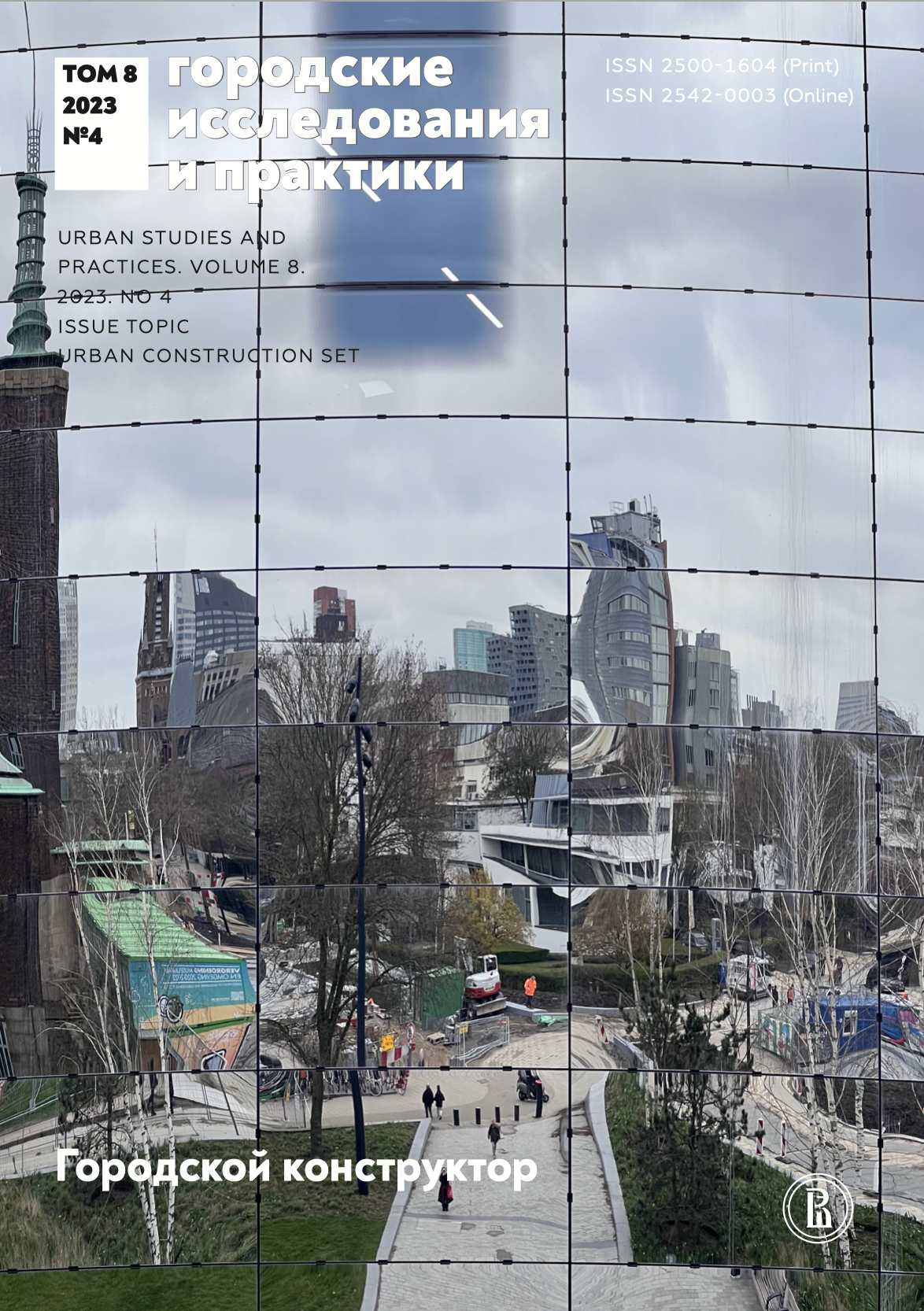Reality vs Regulation: Informal Practices of Spatial Development in Krasnodar, Russia
Аннотация
In the research environment, informal urban development has traditionally been studied in the cities of the Global South. However, in the Eastern European context, informal urban development differs as land use regulation goes through the process of post-socialist transformation. Krasnodar is one of the biggest and fastest growing cities in Russia, where informal construction practices and bottom-up approaches in spatial redevelopment are widely spread despite the strict regulation of housing construction and precise tools for identification of informality. The work presentsa step towards the discovery of this phenomenon. In the spotlight we put the exploration of inner synergetic inconsistency of legal relations, connecting economic, institutional, demographic, and sociopolitical context to understand the contradiction between formal and informal urban life. The research methods include spatial and regulatory documents analyses, in-depth interviews with different collective actors (city administration, activists, experts in urban development, locals living in informal). The core of the research — the machinery of the conflict behind the legalization process. Findings of this work illustrate a number of reasons behind the spread of informal settlements in Krasnodar and their role in urban development. While administrative power does not seek compromise with locals and migrants, the mistrust of others embodies itself as unguided and spontaneous urban development.
Скачивания
Литература
AlSayyad N., Roy A. (2003) Urban Informality: Transnational Perspectives from the Middle East, Latin America, and South Asia. Lanham: Lexington Books.
Alterman R., Calor I. (2020) Between Informal and Illegal in the Global North: Planning Law, Enforcement, and Justifiable Noncompliance. Comparative Approaches to Informal Housing around the Globe / U. Grashoff (ed.). London: UCL Press, pp. 150–185.
De Soto H. (1989) The Other Path: The Invisible Revolution in the Third World. London: I. B. Taurus.
Devlin R.T. (2018) Asking ‘Third World questions’ of First World informality: Using Southern Theory to Parse Needs from Desires in an Analysis of Informal Urbanism of the Global North. Planning Theory, vol. 17, no 4, pp. 568–587.
Dovey K., Kamalipour H. (2017) Informal/Formal Morphologies. Mapping Urbanities: Morphologies, Flows, Possibilities / K. Dovey, E. Pafka, M. Ristic (eds.). New York: Routledge, pp. 223–248.
Feige E.L. (1990) Defining and Estimating Underground and Informal Economies: The New Institutional Economics Approach. World Development, vol. 18, no 7, pp. 989–1002.
General Plan of Krasnodar issued January 26, 2012
Gonçalves J.M., Gama J.M.R.F. (2020) A Systematization of Policies and Programs Focused on Informal Urban Settlements: Reviewing the Cases of São Paulo, Luanda, and Istanbul. Journal of Urbanism: International Research on Placemaking and Urban Sustainability, vol. 13, no 4, pp. 466–488.
Hall P., Pfeiffer U. (2000) Urban Future 21: A Global Agenda For 21st Century Cities. London: E & FN Spon.
Harris R. (2018) Modes of Informal Urban Development: A Global Phenomenon. Journal of Planning Literature, vol. 33, no 3, pp. 267–286.
Information About the Situation in the Regions (2016) Annex № 2 to the Recommendations of the Council under the President of the Russian Federation for Civil Society Development and Human Rights following a special meeting on March 21, 2016. Available at: http://www.president-sovet.ru/files/16/a7/16a7293d663d4eb6b5bbdf11c8cb4e90.pdf (accessed 30 May 2022).
Karbainov N. (2014) How the Owners (Do Not) Become Private Proprietors: Conflicts over Land in Ulan-Ude and Sochi, The Journal of Sociology and Social Anthropology, vol. 17, no 5, pp. 85–108.
Kosareva N., Polidi T., Puzanov A. (2013) Housing Construction Market in the Russian Federation: Current Status and Development Prospects. Voprosy Ekonomiki, no 3, pp. 109–125.
Land Use Regulation Rules, issued January 30, 2007, p. 6 (as amended on March 28, 2019).
Maltseva D. (2022) Approaches of Typologization of Unauthorized Building: Illegality and Informality in the Moscow and Krasnodar Regions. Term paper. Graduate School of Urbanism, National Research University Higher School of Economics.
Mohanty M. (2019) Challenges of Informal Urbanization. Sustainable Cities and Communities. Encyclopedia of the UN Sustainable Development Goals / W.L. Filho, A. Azul, L. Brandli, P. Özuyar, T. Wall (ed.). Cham: Springer, pp. 45–56.
Musical microdistrict of Krasnodar from a bird’s-eye view (2021)
RU. Available at: https://93.ru/text/gorod/2021/12/12/70312010/ (accessed June 24, 2022
Ndukui C.E. (2013) Challenges of Slum Upgrading for Urban Informal Settlements: Case of Soweto East Village in Kibera Informal Settlements, City of Nairobi. Postgraduate thesis, The University of Nairobi, Kenya.
Perlman J.E. (1979) The myth of marginality: Urban poverty and politics in Rio de Janeiro. Berkeley, CA: University of California Press.
Portes A., Haller W. (2005) The Informal Economy. The Handbook of Economic Sociology / N. J. Smelser and R. Swedberg (ed.). Princeton, NJ: Princeton University Press, pp. 403–425.
Roy A. (2005) Urban Informality: Toward an Epistemology of Planning. Journal of the American Planning Association, vol. 71, no 2, pp. 147–158.
Strategy for Socio-Economic Development of the Krasnodar Region until 2030 (2020) economy.krasnodar.ru. Available at: https://economy.krasnodar.ru/upload/iblock/581/i2f914v1yplwv6l68ljfwqh02e05f6ap/Strategiya-2030-s-izmeneniyami-ot-23.12.2022-goda.pdf
The unified register of self-builders in test mode began its work in the Russian Federation on January 1 (2020) TASS. Available at: https://tass.ru/nedvizhimost/7456741 (accessed 1 May 2022)
Urban Planning Code of the Russian Federation dated December 29, 2004, no 190-FZ (as amended on January 5, 2022) (2022). Legal reference system “Consultant Plus”
Zubarevich N. (2017) Designated agglomerations. Economist Natalya Zubarevich about the main barriers to the million cities development. Vedomosti. Available at: https://www.vedomosti.ru/opinion/articles/2017/07/07/714602-naznachennie-aglomeratsii (accessed July 2, 2022)

